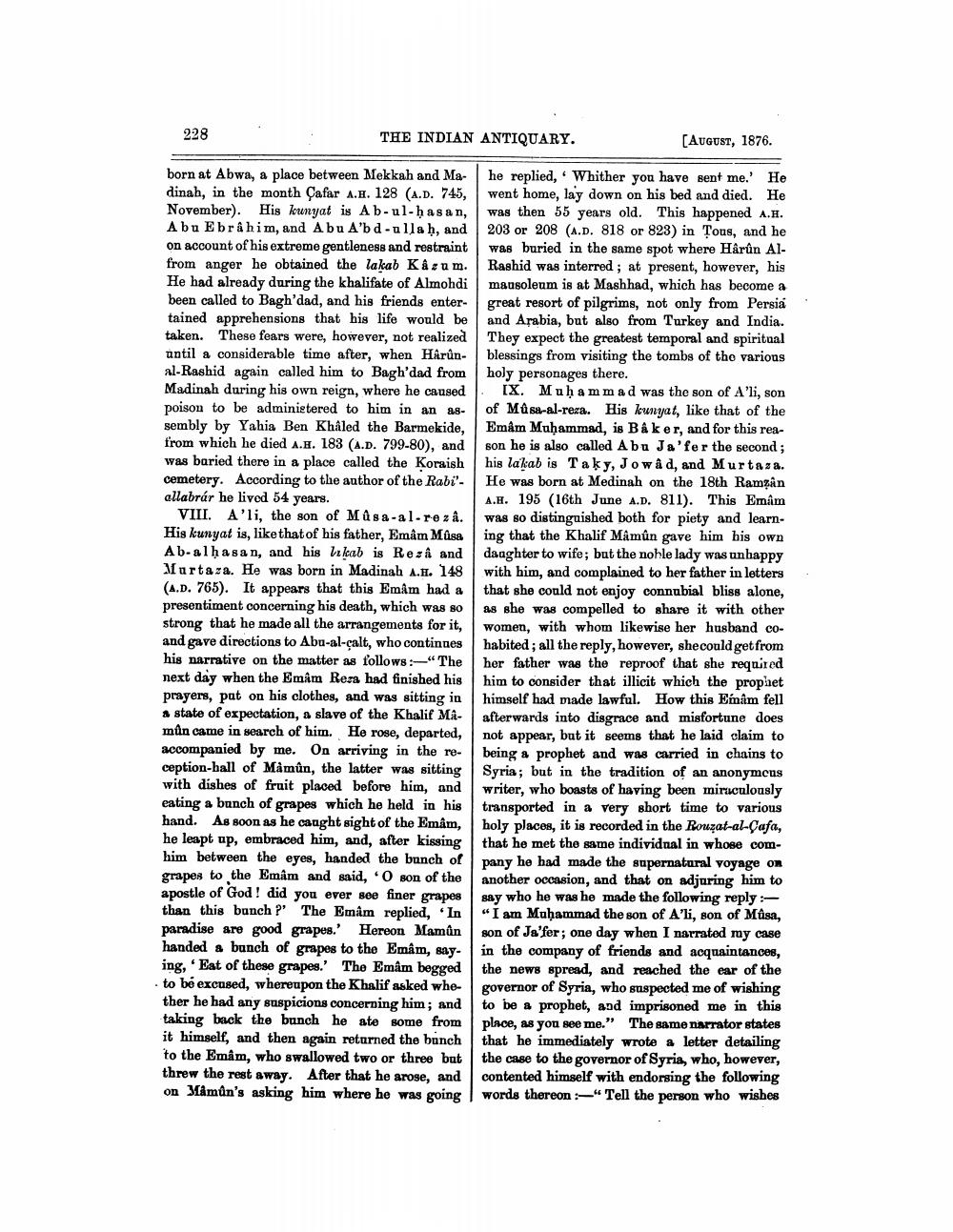________________
228
THE INDIAN ANTIQUARY.
born at Abwa, a place between Mekkah and Madinah, in the month Çafar A.H. 128 (A.D. 745, November). His kunyat is Ab-ul-hasan, Abu Ebrahim, and Abu A'bd-ullah, and on account of his extreme gentleness and restraint from anger he obtained the lakab Kâzum. He had already during the khalifate of Almohdi been called to Bagh'dad, and his friends entertained apprehensions that his life would be taken. These fears were, however, not realized until a considerable time after, when Hârûnal-Rashid again called him to Bagh'dad from Madinah during his own reign, where he caused poison to be administered to him in an assembly by Yahia Ben Khâled the Barmekide, from which he died A.H. 183 (A.D. 799-80), and was buried there in a place called the Koraish cemetery. According to the author of the Rabi'allabrár he lived 54 years.
VIII. A'li, the son of Mûsa-al-rezâ. His kunyat is, like that of his father, Emâm Músa Ab-alhasan, and his lakab is Rezâ and Murtaza. He was born in Madinah A.H. 148 (A.D. 765). It appears that this Emâm had a presentiment concerning his death, which was so strong that he made all the arrangements for it, and gave directions to Abu-al-çalt, who continues his narrative on the matter as follows:-"The next day when the Emâm Reza had finished his prayers, put on his clothes, and was sitting in a state of expectation, a slave of the Khalif Mâmân came in search of him. He rose, departed, accompanied by me. On arriving in the reception-hall of Mâmûn, the latter was sitting with dishes of fruit placed before him, and eating a bunch of grapes which he held in his hand. As soon as he caught sight of the Emâm, he leapt up, embraced him, and, after kissing him between the eyes, handed the bunch of grapes to the Emâm and said, 'O son of the apostle of God! did you ever see finer grapes than this bunch?' The Emâm replied, 'In paradise are good grapes.' Hereon Mamûn handed a bunch of grapes to the Emâm, saying, Eat of these grapes.' The Emâm begged to be excused, whereupon the Khalif asked whether he had any suspicions concerning him; and taking back the bunch he ate some from it himself, and then again returned the bunch to the Emâm, who swallowed two or three but threw the rest away. After that he arose, and on Mâmûn's asking him where he was going
[AUGUST, 1876.
he replied, Whither you have sent me.' He went home, lay down on his bed and died. He was then 55 years old. This happened A.H. 203 or 208 (A.D. 818 or 823) in Tous, and he was buried in the same spot where Hârûn AlRashid was interred; at present, however, his mausoleum is at Mashhad, which has become a great resort of pilgrims, not only from Persia and Arabia, but also from Turkey and India. They expect the greatest temporal and spiritual blessings from visiting the tombs of the various holy personages there.
IX. Muhammad was the son of A'li, son of Musa-al-reza. His kunyat, like that of the Emâm Muḥammad, is Baker, and for this reason he is also called Abu Ja'fer the second; his lakab is Taky, Jowâd, and Murtaza. He was born at Medinah on the 18th Ramzân A.H. 195 (16th June A.D. 811). This Emâm was so distinguished both for piety and learning that the Khalif Mâmûn gave him his own daughter to wife; but the noble lady was unhappy with him, and complained to her father in letters that she could not enjoy connubial bliss alone, as she was compelled to share it with other women, with whom likewise her husband cohabited; all the reply, however, she could get from her father was the reproof that she required him to consider that illicit which the prophet himself had made lawful. How this Emâm fell afterwards into disgrace and misfortune does not appear, but it seems that he laid claim to being a prophet and was carried in chains to Syria; but in the tradition of an anonymous writer, who boasts of having been miraculously transported in a very short time to various holy places, it is recorded in the Rouzat-al-Çafa, that he met the same individual in whose company he had made the supernatural voyage on another occasion, and that on adjuring him to say who he was he made the following reply:"I am Muhammad the son of A'li, son of Musa, son of Ja'fer; one day when I narrated my case in the company of friends and acquaintances, the news spread, and reached the ear of the governor of Syria, who suspected me of wishing to be a prophet, and imprisoned me in this place, as you see me." The same narrator states that he immediately wrote a letter detailing the case to the governor of Syria, who, however, contented himself with endorsing the following words thereon:-"Tell the person who wishes




